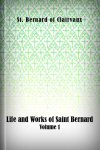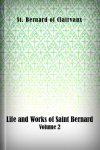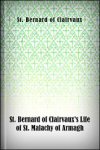The Works of St. Bernard of Clairvaux (9 vols.)
Digital Verbum Edition
Overview
These nine volumes offer an intriguing glimpse into the life and works of St. Bernard of Clairvaux, a twelfth-century Cistercian abbot and Doctor of the Church. Study the chronology of St. Bernard’s life through his collected letters. Read his meditations on prayer and God’s love. Gain access to 104 of his sermons—many of which examine the Song of Songs in vibrant detail. Translated into English and rich with biographical elements, this collection will give you an appreciation for this saint who influenced reforms, popularized the Cistercian order, and whose theology and legacy thrive even today.
In the Verbum editions, these volumes are enhanced by amazing functionality. Important terms link to dictionaries, encyclopedias, and a wealth of other resources in your digital library. Perform powerful searches to find exactly what you’re looking for. Take the discussion with you using tablet and mobile apps. Your software brings the most efficient and comprehensive research tools together in one place, so you get the most out of your study.
Equip yourself with the Classics of Western Spirituality Bundle (126 vols.).
Key Features
- Opens a window onto the life and works of St. Bernard of Clairvaux
- Presents English translations of his sermons, letters, treatises, and more
- Offers a Bernadine chronology
- Provides insight into the Middle Ages
Product Details
- Title: The Works of St. Bernard of Clairvaux
- Author: Bernard of Clairvaux
- Volumes: 9
- Pages: 2,899
- Christian Group: Catholic
- Resource Type: Topical, Sermons, Biographies
- Topic: Medieval Church
Individual Titles
- Life and Works of Saint Bernard, vol. 1
- Life and Works of Saint Bernard, vol. 2
- Saint Bernard on Consideration
- Saint Bernard on the Love of God
- Sermons of St. Bernard on Advent & Christmas: Including the Famous Treatise on the Incarnation Called “Missus Est”
- St. Bernard of Clairvaux’s Life of St. Malachy of Armagh

Life and Works of Saint Bernard, Volume 1
- Author: Bernard of Clairvaux
- Translator: Samuel J. Eales
- Publisher: Burns and Oates
- Publication Date: 1889
- Pages: 456
In volume one of Samuel J. Eales’ comprehensive two-volume collection of letters from Saint Bernard, Eales provides an in-depth introduction to the life and works of St. Bernard, a Bernadine chronology, and a quick list of dates for each of the included letters. Eales also provides a summary at the top of each letter, as well as concise biographical material for each letter’s recipient. Volume one includes letters 1–145.
In his writings great natural powers shine forth resplendently, an intellect more than that of the subtle Abelard, an eloquence that was irresistible, an imagination like a poet, and a simplicity that wins the admiration of all. Priests will find it a most valuable book for spiritual reading and sermons.
—Catholic World
No writer of the Middle Ages is so fruitful of moral inspiration as S. Bernard, no character is more beautiful, and no man in any age whatever so faithfully represented all that was best in the impulses of his time, or exercise so powerful an influence upon it. . . . There is no man whose letters cover so many subjects of abiding interest, or whose influence was so widely spread.
—Athenaeum
Samuel J. Eales was principal of St. Boniface, Warminster, and the author and translator of numerous books, including Sermons Ancient and Modern, The Voice from the Cross: Seven Brief Meditations on the Words of Our Lord Jesus Christ Spoken from His Cross, and The Privilege of Prayer.

Life and Works of Saint Bernard, Volume 2
- Author: Bernard of Clairvaux
- Translator: Samuel J. Eales
- Publisher: Burns and Oates
- Publication Date: 1889
- Pages: 485
In volume two of Samuel J. Eales’ comprehensive two-volume collection of letters from Saint Bernard, Eales provides an introduction with a description of the position and site of the Abbey of Clairvaux and some notes on the Seal of St. Bernard. Eales also provides a summary at the top of each letter, as well as concise biographical material for each letter’s recipient. Volume one includes letters 146–380.
The letters are of great historic interest, and many of them most touching. The simple earnestness of the man, and his utter freedom from ambition, strike us on almost every page.
—Notes and Queries
English readers of every class and creed owe a debt of gratitude to Dr. Eales for the great and useful work which he has undertaken. It is strange that now for the first time has such a task been even, as far as we are aware, approached. We have indeed much to be grateful for to the first English translator of S. Bernard’s works.
—This Month
Samuel J. Eales was principal of St. Boniface, Warminster, and the author and translator of numerous books, including Sermons Ancient and Modern, The Voice from the Cross: Seven Brief Meditations on the Words of Our Lord Jesus Christ Spoken from His Cross, and The Privilege of Prayer.

Saint Bernard on Consideration
- Author: Bernard of Clairvaux
- Translator: George Lewis
- Publisher: Oxford: Clarendon Press
- Publication Date: 1908
- Pages: 168
St. Bernard’s On Consideration reminds the pastor that love for God and a rich life of prayer must precede any action in the temporal sphere—regardless of the distractions and temptations of his office. Originally written for his friend and former disciple, Pope Eugenius III, On Consideration remains a favorite of popes even to this day and was highly praised by John Calvin. St. Bernard’s meditations are an enduring source of inspiration for all pastors.

On the Love of God
- Author: Bernard of Clairvaux
- Translators: Marianne Caroline and Coventry Patmore
- Publisher: Burns and Oates
- Publication Date: 1884
- Pages: 222
On the Love of God addresses the reasons we ought to love God and the manner and different degrees of this love. St. Bernard teaches that God Himself is the motive of our love for him and that nothing is more reasonable and nothing more profitable than loving him. He then lays out the degrees whereby the soul proceeds from loving God for its own sake to loving the self only for God.

Sermons of St. Bernard on Advent & Christmas: Including the Famous Treatise on the Incarnation Called “Missus Est”
- Author: Bernard of Clairvaux
- Publisher: R. & T. Washbourne
- Publication Date: 1909
- Pages: 166
These 19 sermons, originally given in Latin at the Chapter-house at Clairvaux, all relate to the mysteries of Advent and Christmas. John Cuthbert Hedley, the bishop of Newport from 1881–1915, provides and introduction to these illuminating sermons.

St. Bernard of Clairvaux’s Life of St. Malachy of Armagh
- Author: Bernard of Clairvaux
- Translator: H.J. Lawlor
- Publisher: SPCK
- Publication Date: 1920
- Pages: 183
Written before the Synod of Kells met in 1152, Bernard of Clairvaux’s biography of Malachy of Armagh covers Malachy’s entire spirit-filled life, from boyhood to his canonization. Before the English translation of St. Bernard’s Life of St. Malachy of Armagh, translator H.J. Lawlor provides an in-depth, 60+ page introduction to the state of the Irish Church during the time of St. Malachy’s life, a time he calls “a Reformation, though it might perhaps be more accurately described as an ecclesiastical revolution.” Also included with this volume are various letters and two sermons from St. Bernard.
Dr. Lawlor has given us a delightful translation of St. Bernard’s Life of St. Malachy of Armagh. His introduction and annotations admit us to an intimate view of the Church of Ireland in the most critical period of her history.
—Church Quarterly Review
Hugh Jackson Lawlor (1860–1938) was professor of ecclesiastical history at the University of Dublin and was also an Anglican dean. He was the author and translator of numerous books, including Eusebius, Bishop of Caesarea, The Heresy of the Phrygians, and A Fresh Authority for the Synod of Kells, 1152.

St. Bernard's Sermons on the Canticle of Canticles, Volume 1
- Author: Bernard of Clairvaux
- Publisher: Browne and Nolan
- Publication Date: 1920
- Pages: 497
Translated from the original Latin into English, these sermons on the “Song of Solomon, instead of being dry-as-dust homilies, are as varied and many-colored as is the spiritual life, every aspect of which they discuss with equal solidity and elegance.” Volume one of St. Bernard’s Sermons on the Canticle of Canticles contains sermons 1–43.

St. Bernard’s Sermons on the Canticle of Canticles, Volume 2
- Author: Bernard of Clairvaux
- Publisher: Browne and Nolan
- Publication Date: 1920
- Pages: 539
Translated from the original Latin into English, these sermons on the “Song of Solomon, instead of being dry-as-dust homilies, are as varied and many-colored as is the spiritual life, every aspect of which they discuss with equal solidity and elegance.” Volume two of St. Bernard’s Sermons on the Canticle of Canticles contains sermons 44–86.
He treats theological subjects after the manner of the ancients, on which account, and because of the great excellence of his writings he is reckoned amongst the Fathers. And though the youngest of them in time, he is one of the most useful to those who desire to study and to improve their hearts in sincere piety.
What can so enliven our devotion, excite our contrition, or inflame our love as the life and teaching of the blessed Father St. Bernard? Where shall we find one more efficacious in exhorting to virtue, in dissuading from vice, in lifting our affections from earth to heaven?
—Henricus de Hassia
The sermons are tremulous with the incessant glimmer of allegories. . . . so rich in their spiritual suggestiveness that they strike upon the mind like rays straight from heaven, and belonging to that ‘light that never was on sea or shore.’

The Treatise of St. Bernard Abbat of Clairvaux: Concerning Grace and Free Will, Addressed to William, Abbat of St. Thierry
- Author: Bernard of Clairvaux
- Translator: Watkin W. Williams
- Publisher: SPCK
- Publication Date: 1920
- Pages: 183
Watkin W. Williams translates from the original Latin into English St. Bernard of Clairvaux’s treatise Concerning Grace and Free Will. Williams provides abundant notes and commentary on St. Bernard’s exposition, as well as an in-depth introduction.
Watkin Wynn Williams is the author and translator of numerous books, including Monastic Studies, Studies in St. Bernard of Clairvaux, The Moral Theology of the Sacrament of Penance, and St. Bernard: The Man and His Message.
About Bernard of Clairvaux
Bernard of Clairvaux (1090–1153) was a French abbot, confessor, saint, and Doctor of the Church. He is honored as a founder of the Cistercian order because of his role in popularizing the order in the twelfth century. He takes his name from a monastery he founded on June 25, 1115—soon after joining the Cistercians. He named the monastery Claire Vallée, which evolved into Clairvaux. St. Bernard spent 40 years in cloister, but wielded considerable influence in the Church during that time—working to end a schism, combat heresy, and start the Second Crusade. After his death, he was canonized by Pope Alexander III in 1174. His numerous theological writings are so timeless and powerful that they earned him the title of Doctor of the Church in 1830, and Pope Pius XII wrote an encyclical on him, Doctor Mellifluus, in 1953.
Equip yourself with the Classics of Western Spirituality Bundle (126 vols.).
Key Features
- Opens a window onto the life and works of St. Bernard of Clairvaux
- Presents English translations of his sermons, letters, treatises, and more
- Offers a Bernadine chronology
- Provides insight into the Middle Ages
Product Details
- Title: The Works of St. Bernard of Clairvaux
- Author: Bernard of Clairvaux
- Volumes: 9
- Pages: 2,899
- Christian Group: Catholic
- Resource Type: Topical, Sermons, Biographies
- Topic: Medieval Church
About Bernard of Clairvaux
Bernard of Clairvaux (1090–1153) was a French abbot, confessor, saint, and Doctor of the Church. He is honored as a founder of the Cistercian order because of his role in popularizing the order in the twelfth century. He takes his name from a monastery he founded on June 25, 1115—soon after joining the Cistercians. He named the monastery Claire Vallée, which evolved into Clairvaux. St. Bernard spent 40 years in cloister, but wielded considerable influence in the Church during that time—working to end a schism, combat heresy, and start the Second Crusade. After his death, he was canonized by Pope Alexander III in 1174. His numerous theological writings are so timeless and powerful that they earned him the title of Doctor of the Church in 1830, and Pope Pius XII wrote an encyclical on him, Doctor Mellifluus, in 1953.